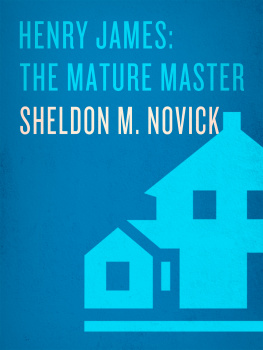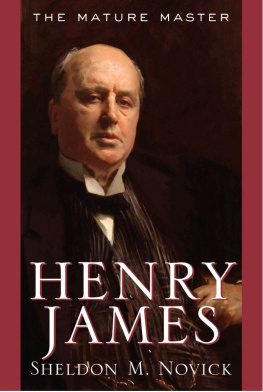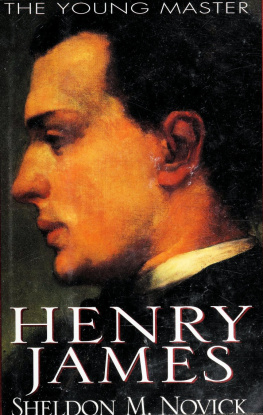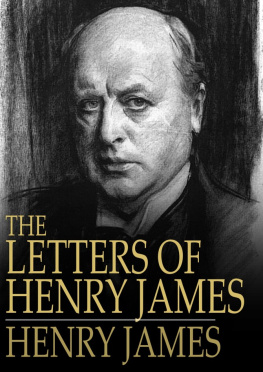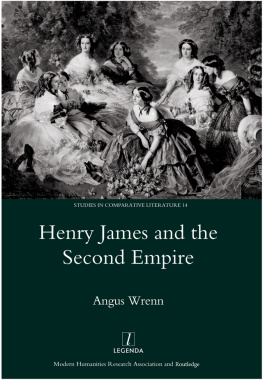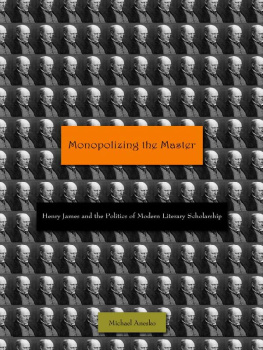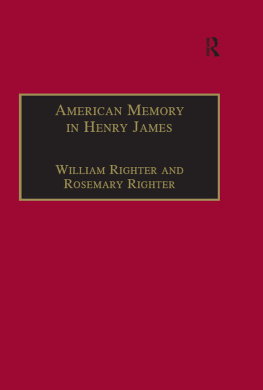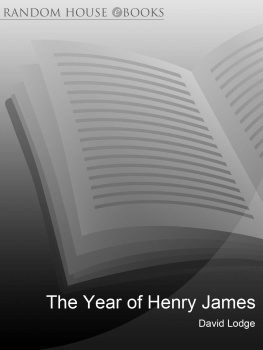Sheldon M. Novick - Henry James
Here you can read online Sheldon M. Novick - Henry James full text of the book (entire story) in english for free. Download pdf and epub, get meaning, cover and reviews about this ebook. year: 2020, publisher: Random House Publishing Group, genre: Non-fiction / History. Description of the work, (preface) as well as reviews are available. Best literature library LitArk.com created for fans of good reading and offers a wide selection of genres:
Romance novel
Science fiction
Adventure
Detective
Science
History
Home and family
Prose
Art
Politics
Computer
Non-fiction
Religion
Business
Children
Humor
Choose a favorite category and find really read worthwhile books. Enjoy immersion in the world of imagination, feel the emotions of the characters or learn something new for yourself, make an fascinating discovery.
- Book:Henry James
- Author:
- Publisher:Random House Publishing Group
- Genre:
- Year:2020
- Rating:4 / 5
- Favourites:Add to favourites
- Your mark:
- 80
- 1
- 2
- 3
- 4
- 5
Henry James: summary, description and annotation
We offer to read an annotation, description, summary or preface (depends on what the author of the book "Henry James" wrote himself). If you haven't found the necessary information about the book — write in the comments, we will try to find it.
Henry James — read online for free the complete book (whole text) full work
Below is the text of the book, divided by pages. System saving the place of the last page read, allows you to conveniently read the book "Henry James" online for free, without having to search again every time where you left off. Put a bookmark, and you can go to the page where you finished reading at any time.
Font size:
Interval:
Bookmark:
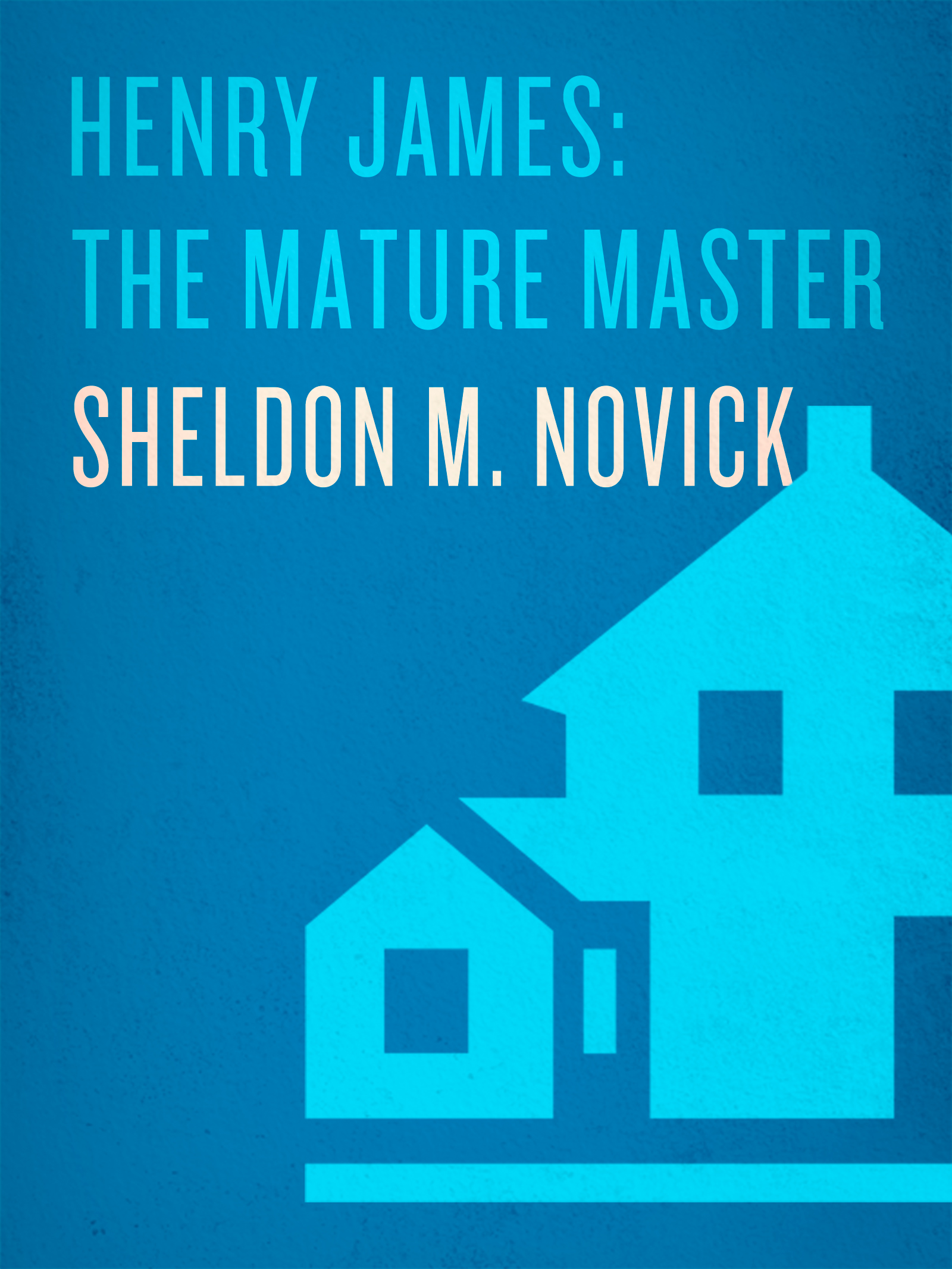
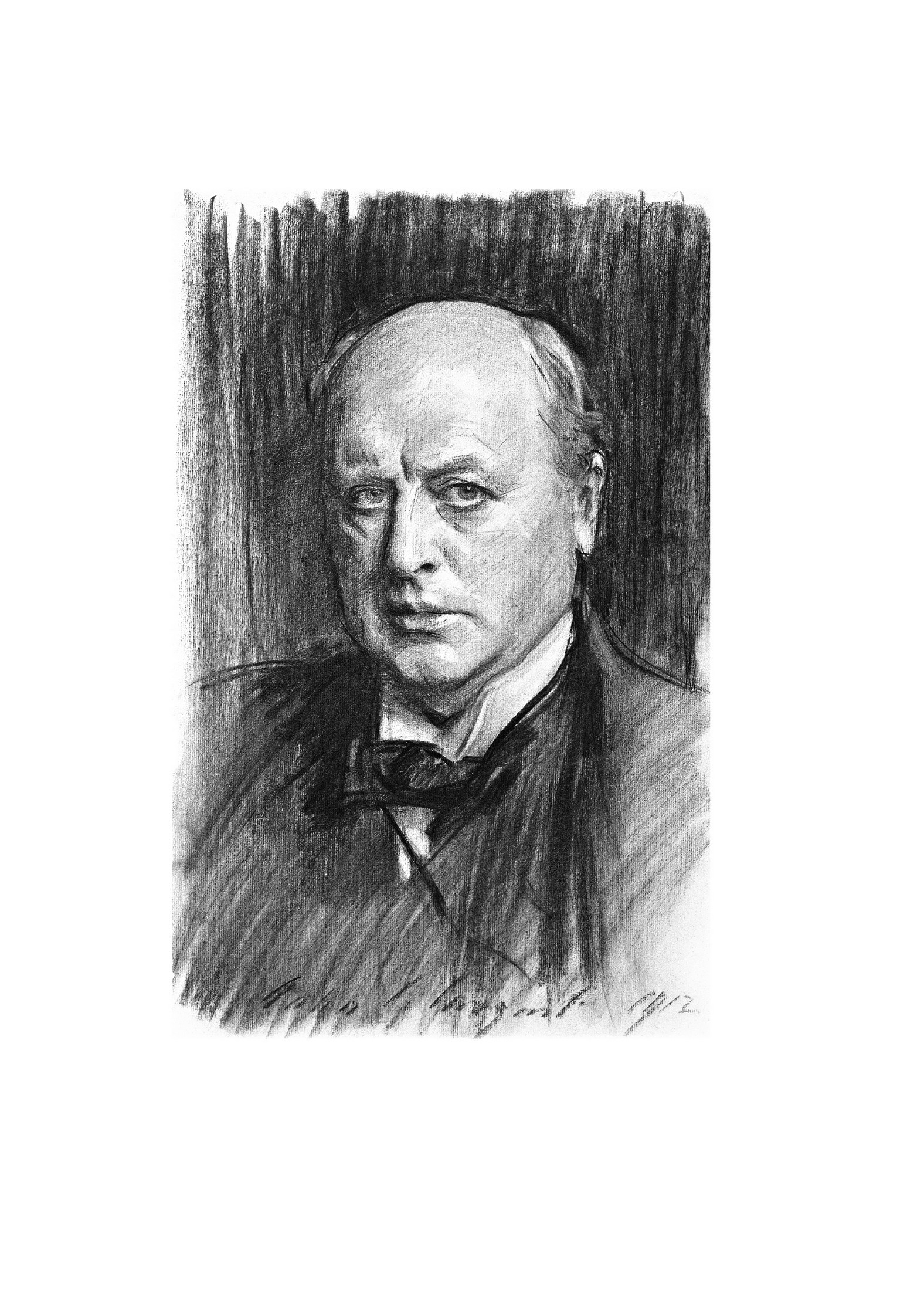
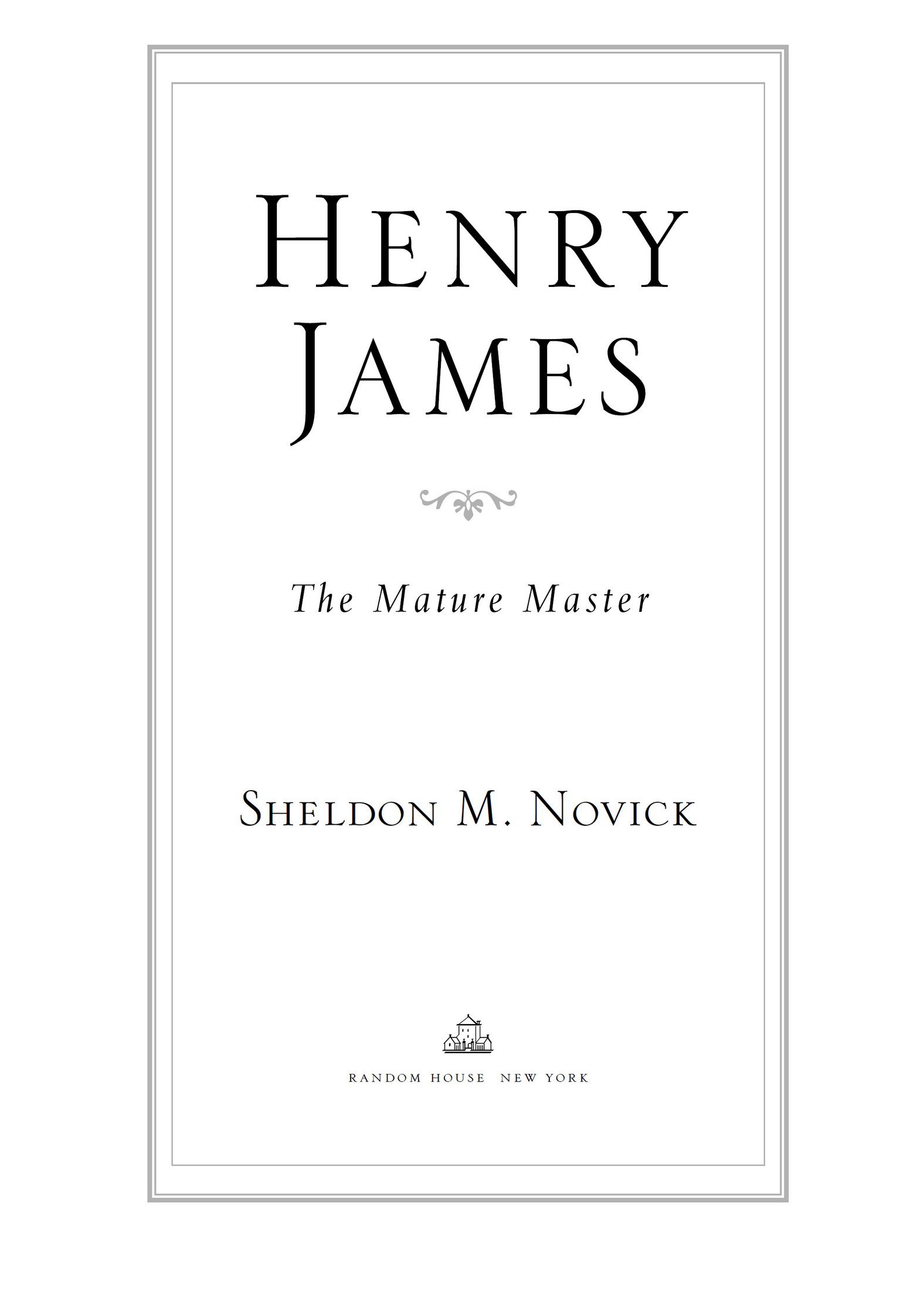
Copyright 2007 by Sheldon M. Novick
All rights reserved.
Published in the United States by Random House, an imprint of The Random House Publishing Group, a division of Random House, Inc., New York.
R ANDOM H OUSE and colophon are registered trademarks of Random House, Inc.
Frontispiece image: charcoal drawing by John Singer Sargent, 1912 (The Royal Collection, Windsor Castle; digital image copyright 2005 by Queen Elizabeth II).
ISBN9780679450238
Ebook ISBN9780307797742
www.atrandom.com
Book design by Simon M. Sullivan, adapted for ebook
v5.4
a
Although this is the second and concluding volume of a biography of Henry James, it is meant also to be read as a self-contained account of a man who was both great and good, and of a civilization he feared was dying.
After the first volume of my biography of James was published, recounting his childhood and youth, my work was interrupted for several years, but the delay has been salutary in some ways. In the intervening time, scholars have unearthed and made accessible a great mass of new material concerning the years of Jamess maturity, when he wrote the books for which he is now mainly remembered, that was not available to earlier biographers and from which I have greatly benefited.
Jamess published work and his copious notebooks contain a singular record of the manner in which a writer of fiction converts the raw materials of experience into works of art. Jamess lettersmost of which have never been publishedprovide a parallel report of his private life, the rich experiences that were his raw materials, his loves and his domestic concerns, his successes and failures in a lifelong effort to harmonize passion and duty, life and art in Europe and America, in a time that calls across the gulf of the twentieth century to ours. He recorded the gradual development of his practice of fiction, his invention of dramatic imagery that conveys with startling realism passionate, fully rounded human beings held together by strong forces. In his life and in his art he sought an ideal of civilization: a humanist garden. His constant theme was the limits, material and moral, on freedom. We have the raw materials with which he worked, or some of them, and an account of the manner in which they were transmuted into art.
Taken together these materials allow one to tell a reasonably well rounded story. While there are a half-dozen previous biographies, and an enormous critical literature, I have taken a fresh look at the primary materials, including the hundreds of Jamess letters that have only recently been made available. Many of Jamess letters, such as those in the late Adeline Tintners extensive collection, now in the Berg Collection of the New York Public Library, were not available to previous biographers; many other of the roughly 10,500 surviving letters that James wrote, scattered in various locations and often close to illegible, although nominally open to scholars, have now been transcribed or published, making them practically accessible. I have also benefited greatly from recent scholarly studies that have not yet been reflected in work for a general audience, as well from older works that have fallen into obscurity. I have been reassured by such studies as Michael Egans Henry James: The Ibsen Years that literary and biographical views may converge, and give a rounded image.
The Henry James the reader will meet in these pages may seem unfamiliar, both in detail and in general outline, however. This is a matter in part of new materials and in part of selection. In an epilogue to this volume I describe the manner in which an image of James formed and achieved the force of an ideal in the years that followed his death. The received view of James was of a passive, fearful man, a detached observer of the life around him, in which he did not participate. He was vaguely thought to have had ample independent means and so to have been able to write self-indulgent works that never found a wide audience. His brief career as a playwright has been repeatedly described as an utter failure, one in which he at last was driven from the stage by the scorn of the audience. This canonical image is likely to remain with us, despite the evidence that it is incorrect in detail and misleading overall.
The following account is based on primary materials, Jamess own writings and those of his contemporaries, and is an attempt to portray James in his years of maturity and success freshly and in some ways for the first time. Far from passive or detached, he was an active and engaged man, passionate and energetic, for whom relationships were the ground of life and the subject of his art.
Henry Jamess surviving letters have been catalogued, and much of the information they contain summarized in the online calendar assembled by Steven H. Jobe, who was kind enough to share his work in progress with me. Susan E. Gunter and Steven H. Jobe have published valuable editions of Jamess letters to women and young men and shared typescripts of unpublished letters. Philip Horne has recovered and published many of Jamess letters to writers, editors, and agents. Peter A. Walker and Greg W. Zacharias have undertaken to assemble and publish all of Jamess letters, and they too have shared their work in progress. I am indebted for advice and support to Roger Asselineau, especially for his illuminating suggestions concerning Jamess plays; to my old friend Samuel R. Delany, who shared his helpful thoughts about Jamess ghost stories; and to Fred Kaplan, who shared research notes with me when I began this project. Early in my work, the late Leon Edel courteously answered my questions about James, and the materials he assembled and published during his lifetime, frequently cited in the pages that follow, were an invaluable aid. Adele de Cruz has helped me in numerous ways to understand the world of art and artists in which James flourished.
It is a particular pleasure to acknowledge my numerous debts to Susan E. Gunter, who read and commented on successive drafts. Professor Gunters biography of Alice Howe James, shortly to be published, was particularly helpful. John R. Bradley read a draft of the first chapter of this book, and his encouragement and advice have been helpful in many ways. As editor of two collections of essays on James, he gave me an opportunity to explore some of the ideas developed more fully here; as did the editors of The Henry James Review and DoubleTake magazine.
Equally helpful has been the work of modern scholars studying the late Victorian and Edwardian era, the last half of the long nineteenth century, in which James lived and worked. The twentieth century was anxious to forget its parents and to make a new world for itself, but the twenty-first seems eager to remember that lost world, before the era of revolutions, genocides, and world wars. Several authors have done much to recover the rich details of a working writers life in Jamess London; Michael Aneskos reconstruction of Jamess dealings with publishers was particularly valuable to me and is frequently cited in what follows. Also valuable have been recent biographies of women who were among Jamess closest friends: Mary Ward, Edith Wharton, Violet Paget, Elizabeth Robins, and Gertrude Bell, as well as recent doctoral dissertationsI am particularly obliged to Tamie Watters for her unpublished dissertation on Rhoda Broughton and her transcripts of Broughtons letters, which saved me much labor. The Victorian bachelor has also emerged from the shadows in excellent recent biographies of Edmund Gosse, J. A. Symonds, and Oscar Wilde, and shorter studies of Morton Fullerton, Howard Sturgis, and others. Also helpful to me in recovering Jamess intellectual world were Theoharis C. Theohariss study of the passing of the classical tradition,
Font size:
Interval:
Bookmark:
Similar books «Henry James»
Look at similar books to Henry James. We have selected literature similar in name and meaning in the hope of providing readers with more options to find new, interesting, not yet read works.
Discussion, reviews of the book Henry James and just readers' own opinions. Leave your comments, write what you think about the work, its meaning or the main characters. Specify what exactly you liked and what you didn't like, and why you think so.

